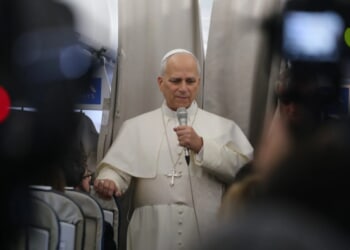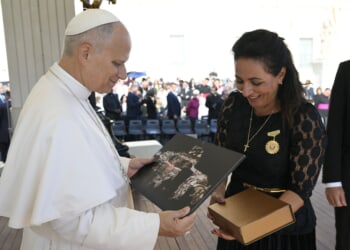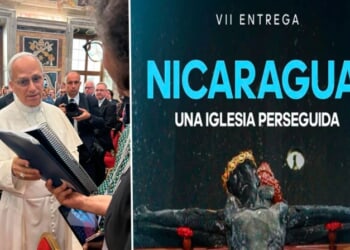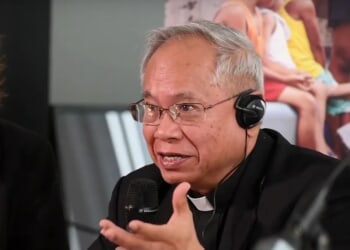Garvan Walshe is a former national and international security policy adviser to the Conservative Party.
When the Nobel Committee gave Maria Corina Machado the Nobel peace prize for her resistance to Venezuela’s dictator Nicolás Maduro they thought they had deftly dodged the AI-video scat artist who happens to have been elected to the White House.
But if there’s one thing that Trump can’t abide, is not being at the centre of things. That’s why he upstaged his own defence secretary, (which he has unofficially renamed “Secretary of War”) and told his generals to prepare to America’s citizens as their training grounds.
Perhaps Machado’s award has drawn his beady eye a little further towards Venezuela, where the might of the US military is being deployed to attack alleged Venezuelan drug smuggling boats that may not be smuggling drugs and in at least one case not even Venezuelan.
There’s surprisingly detailed chatter about attempts, within the administration, to plot regime change against Maduro.
The US has assembled some assault ships and 4000 marines in the area, and even deployed F35 jets to Puerto Rico, not their usual staging area. Some estimates even put the number of troops at 10000.
These would probably be enough troops to invade Panama (though 30,000 were used to remove drug-smuggling dictator Manuel Noriega in 1989) but far too few to topple Maduro:
Venezuela is a country of 30 million people.
The US has at its disposal a huge number of instruments to bribe, threaten and destroy adversaries and irritants without consequences that will be immediately felt by the current administration. The question is not usually “can we destroy X” because the answer is usually yes, but whether the consequences of doing so are worthwhile, whether they fit into a notion of strategy – or as Americans like to call it “grand strategy”.
All postwar administrations had a notion of grand strategy: whether it was to contain the Soviet Union, prevent the spread of communism to countries like Vietnam, outspend the USSR, take advantage of its collapse to form a Europe “whole and free”, and a post-communist Latin America, defeat Al-Qaeda and establish the democracy in the Middle East by military means or withdraw from the Middle East to focus on China.
Having a strategy didn’t mean success — as the list above shows, the record was mixed, but it allowed the US to set priorities and try not to do too many things at cross-purposes. Republicans and Democrats alike built up an “interagency process” to get State, the Pentagon and the NSC (and occasionally economic departments ) to come up with policy.
That process no longer exists, having been replaced by a fight over who gets Trump’s ear. Currently in favour is Secretary of State Marco Rubio, long an opponent of Maduro and his predecessor Hugo Chavez.
It appears Rubio has been given latitude to put pressure on Maduro. At the same time Trump gets to look intimidating. He even bragged that the defence intelligence agency was conducting covert operations in Venezuela, blowing US operatives’ cover.
So what could the US be up to?
A reasonable aim would be to try arrange for new, free and fair elections to be held in Venezuela, after the last ones were rigged by the Maduro regime. In previous US administrations, military intervention could be used as a threat to force the establishment of of a transitional government that would hold the elections.
More vintage methods could also be due for a comeback. In 2002 the United States appears to have been involved in backing a coup against Maduro’s predecessor, Hugo Chavez. To Washington’s embarrassment, it was caught on video by an Irish pro-Chavez documentary crew that happened to be there to produce a sympathetic portrayal of the regime (the film would be released as The Revolution will not be Televised, and did much better than expected).
But since this is the Trump administration it would be foolish not to consider something less conventional. It is well known that Trump’s mind is moored to the 1980s, and has got hold of the idea that Maduro is a drug kingpin in the style of Panama’s Manuel Noriega who President George H Bush removed in 1989 after invading Panama.
The capabilities assembled near Venezuela include US marines and an amphibious landing ship, as well as F-35 jets, which could be used against Venezuelan command and control facilities in an attempt to confuse and overwhelm the Venezuelan army. It is prudent to assume that plans to try and kill or disperse the regime leadership have been prepared and the intelligence officers Trump admitted to sending to Venezuela have been making attempts to involve anti-Maduro elements of the security forces.
What is certain is that these efforts have been causing disquiet in the US military. This has surfaced in the early retirement of SOUTHCOM’s commander Admiral Alvin Hosley. The US divides the world into regional “combatant commands” of which SOUTHCOM is one, each headed by a four-star General (the UK equivalent would be full General) directly answerable to the Secretary of Defense.
Though it has been suggested that this is due to his disquiet over Trump’s airstrikes on purported drug smuggling boats, it would be unusual for such a small, though serious, matter to provoke the early retirement of so senior an officer: in the American system, such officers only take early retirement in extreme circumstances.
With the right local allies and sufficient forces it could be possible to install the legitimate victor of the last Venezuelan elections, the veteran diplomat Edmundo Gonzalez as head of a transitional government. But the scale required to do so in Venezuela would stretch a competent administration. Not something for someone with Trump’s attention span.

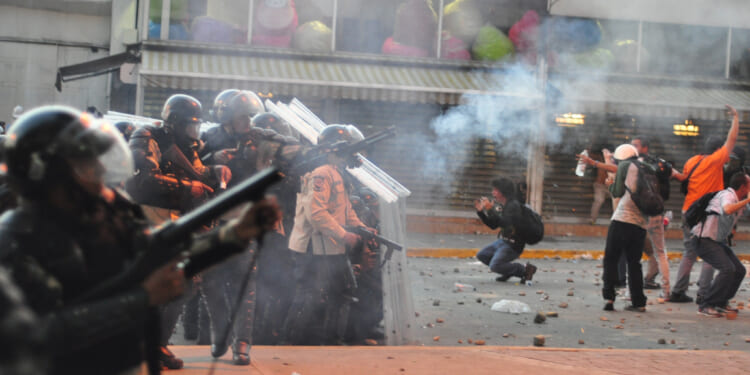






![Florida Officer Shot Twice in the Face During Service Call; Suspect Killed [WATCH]](https://www.right2024.com/wp-content/uploads/2025/12/Inmate-Escapes-Atlanta-Hospital-After-Suicide-Attempt-Steals-SUV-Handgun-350x250.jpg)




